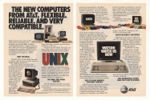UNIX
| UNIX | |
| Type: | Time-sharing |
|---|---|
| Creator: | Ken Thompson, Dennis Ritchie and Douglas McIlroy at Bell Labs |
| Multitasking: | Multi-tasking with swapping/paging (latter added in a later version) |
| Architecture: | Originally PDP-7, then PDP-11; now cross-platform. |
| Date Released: | 1969 |
Unix (officially trademarked as UNIX® - the documentation switched from using 'UNIX' to 'Unix' as of V7) is a computer operating system originally developed in the 1970s by a group of AT&T employees at Bell Labs including Ken Thompson, Dennis Ritchie and Douglas McIlroy.
Today's Unix systems are split into various branches, developed over time by AT&T as well as various commercial vendors and non-profit organizations. A number of clones of Unix, which share the interfaces, and 'look and feel', but no code, have also been produced; most notably, Linux.
Contents
Notable versions
Versions of relevance for hobbyists include the initial versions from inside Bell Labs; it later spread more widely inside the Bell system, at the same time that it was starting to appear outside.
'Research' versions
Note that 'Version' in early UNIXes refers to the revision of the 'UNIX Programmer's Manual'; UNIX didn't really have coordinated distros before about V6:
- Unix "version 0" for PDP-7
- UNIX V1 - The first version of UNIX that has been recently made to run on the PDP-11
- UNIX V2 - Unclear changes
- UNIX V3 - The first version with pipes
- UNIX V4 - The first version with the kernel written in C
- UNIX V5 - The first version with complete source and binaries available
- UNIX V6 - The first widely distributed version; the last before branches started to appear
- Unix V7 - One of the most complete, and the last generally available and PDP-11 version of Research UNIX
- Unix/32V - A port of Seventh Edition to the VAX-11/780
- Unix Eighth Edition - this, and later versions, never contemporaneously escaped from Bell Labs
- Unix Ninth Edition
- Unix Tenth Edition
Other AT&T versions
The rest of the Bell system, outside Bell Labs, soon found it useful, too, and a number of disparate versions, intended for different environments, appeared:
- CB-UNIX - for use in control applications, including real-time systems
- PWB/UNIX - used for production of other systems, in for computer center type usage
- USG UNIX - a version for general use inside the Bell system
These were later unified, and Unix then went commercial and was sold outside AT&T, in a number of releases. (Below is an early ad for AT&T UNIX.)
CSRG releases
Meanwhile the Computer Systems Research Group kept on releasing newer BSD UNIX's, mostly for the VAX, derived from 32V. These had wide distribution, and tremendous impact; they were a major step in UNIX's road to its current ubiguity.
Descended from there are several popular versions:
- FreeBSD focuses on providing a system geared towards a single user.
- NetBSD will run on a variety of 32-bit older systems from the VAX to the Amiga.
- OpenBSD derived from the NetBSD project will run on all kinds of systems.
See also
- Unix OS's
- Unix-based OS's
- UNIX file system
- Repairing early UNIX file systems
- BSD Fast File System
- Unix dump/restore tape format
External links
- The Unix Heritage Society
- The Unix Tree - Complete source for many early versions of Unix
- The Unix Heritage Wiki
- Dennis M. Ritchie - see section "Unix papers and writings, approximately chronological"
- An Oral History of Unix - Lengthy interviews with Thompson, Ritchie, McIlroy, etc
- Unix and Multics
Fun links
- The Unix Power Classic: A book about the Unix Way and its power - Hacker-oriented version of the Dao De Jing
- Rootless Root: The Unix Koans of Master Foo
| v • d • e UNIX Versions, Vendors and Related |
|---|
| Research Unix PDP-7 UNIX • V1 • V2 • V3 • V4 • V5 • V6 • V7 • V8 • V9 • V10 • LSX • MINI-UNIX • Unix/32V
AT&T - CB-UNIX • PWB/UNIX • USG UNIX • System III • System IV • System V BSD - 2.9 BSD • 2.10 BSD • 2.11 BSD • 3BSD • 4BSD • 4.1 BSD • 4.2 BSD • 4.3 BSD • 4.4 BSD BSD Descendants 386BSD • NetBSD • FreeBSD • OpenBSD • NeXTSTEP • Darwin |
| Other - xv6 • AMIX • SunOS • Solaris • ULTRIX • A/UX • XENIX • AIX • Dell UNIX |
